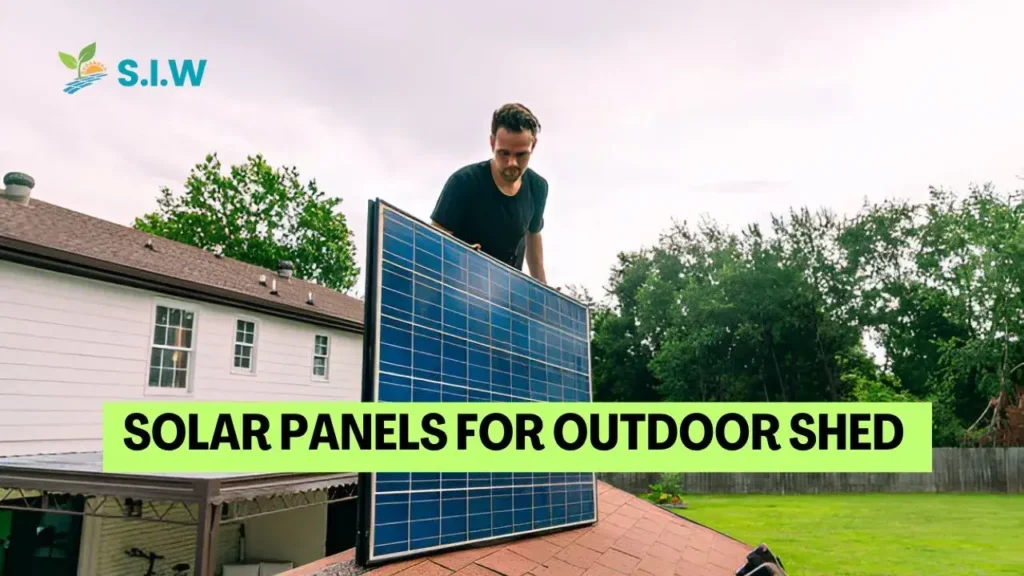In recent years, more homeowners have sought eco-friendly and energy-efficient solutions for powering outdoor spaces, and solar panels for outdoor sheds have emerged as a perfect fit. These systems allow you to generate renewable energy for tools, lighting, and appliances in your shed without relying on traditional electricity sources. Whether you’re looking for a cost-effective way to power your workspace or simply want to reduce your carbon footprint, installing solar panels on your shed could be the solution.
How Solar Panels Work for Outdoor Sheds
At their core, solar panels convert sunlight into electricity through photovoltaic (PV) cells. When sunlight hits these cells, it excites electrons, generating direct current (DC) electricity. This power can be used immediately, stored in solar batteries, or converted to alternating current (AC) for standard appliances through an inverter. For outdoor sheds, solar panels can be mounted on the roof or a nearby structure, providing off-grid electricity or supplementing grid power.
The energy generated from solar panels can be used to run various devices, including lighting, power tools, small refrigerators, or even security systems. This makes solar panels a versatile solution for anyone wanting to create a self-sufficient workspace.
Advantages of Installing Solar Panels for Your Shed
Installing solar panels on your outdoor shed comes with several advantages:
- Cost Savings: Solar panels allow you to harness free energy from the sun, significantly reducing or even eliminating your electricity costs over time.
- Sustainability: Solar energy is renewable and reduces reliance on fossil fuels, making it an environmentally friendly option.
- Off-Grid Power: Solar panels enable you to operate off the grid, which is especially useful in remote locations without access to traditional power sources.
- Increased Property Value: Solar installations can boost the value of your property, especially as more buyers look for green energy solutions.
- Low Maintenance: Once installed, solar panels require minimal maintenance to keep them functioning optimally for years.
Common Uses of Solar Energy in Outdoor Sheds
Depending on the size of your solar power systems for home and the storage capacity, you can power a range of devices in your shed:
- Lighting: Install energy-efficient LED lights to illuminate your workspace or garden.
- Power Tools: Keep essential tools like drills and saws running without worrying about power outages.
- Small Appliances: With a sufficient setup, you can power mini-fridges, fans, or radios.
- Security Systems: Use solar energy to keep your shed secure with cameras and alarms, even at night.
Choosing the Right Solar Panel System for Your Shed
When selecting the best solar panel system for your outdoor shed, consider factors like the amount of sunlight your shed receives, the space available for mounting panels, and your energy needs. The most common types of solar panels for outdoor sheds include:
- Monocrystalline Solar Panels: Known for high efficiency and durability, these are ideal if you have limited space on your shed’s roof.
- Polycrystalline Solar Panels: A cost-effective option that’s slightly less efficient but works well for larger roofs with ample sunlight.
- Flexible Solar Panels: Perfect for curved or small surfaces, flexible panels offer versatility for unique shed designs or tight spaces.
Each panel type has its advantages depending on your specific needs, and some users may prefer portable solar kits that can be easily moved if needed.
Sizing Solar Panels for Your Shed
Sizing your solar panel system correctly is critical to ensuring it meets your energy needs. The first step is calculating how much power your shed requires. Make a list of all the devices you plan to run in your shed and their wattage requirements. For example:
- A basic LED light uses about 10 watts per hour.
- A power drill may use up to 600 watts during operation.
- A mini-fridge could consume around 100 watts per hour.
Once you have a rough estimate, compare this to the wattage output of solar panels. Solar panels are typically rated between 100 and 400 watts, and your energy needs will dictate how many panels you need.
FAQs
What are the best solar panels for a shed?
Monocrystalline panels are often considered the best option due to their high efficiency, but polycrystalline and flexible panels are also viable depending on your budget and shed size.
How long do solar panels for sheds last?
Solar panels can last 25 to 30 years with minimal maintenance, ensuring long-term energy generation.
Can a shed run entirely on solar energy?
Yes, with a properly sized system and battery storage, a shed can operate independently on solar power.
How much do solar panels for sheds cost?
Costs can vary based on the size and type of system, but a basic solar setup for a shed typically ranges from $500 to $2000.
Do I need planning permission to install solar panels on a shed?
In most cases, small solar panel installations on sheds do not require planning permission, but it’s always best to check local regulations.
Are solar panels on a shed worth the investment?
Yes, solar panels can provide long-term savings, environmental benefits, and increased property value, making them a worthwhile investment.
Why Solar Panels Are a Smart Choice for Your Outdoor Shed
Investing in solar panels for your outdoor shed is not only an eco-friendly decision but also a financially savvy one. With the right system, you can reduce or eliminate energy costs, gain independence from the grid, and enhance your property’s value. Whether you’re running a workshop or need a sustainable power source for garden tools, solar panels offer a reliable and cost-effective solution. Get started today and enjoy the long-term benefits of clean, renewable energy in your shed!








